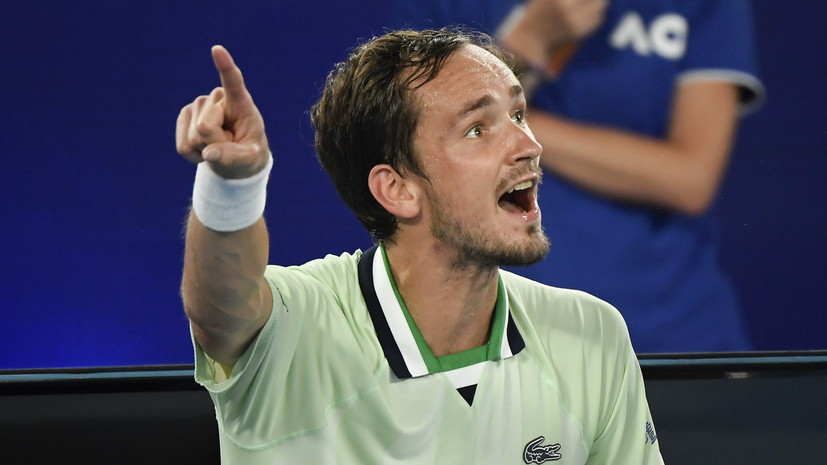The Association of Tennis Professionals this season is not afraid to make bold decisions.
This week, the ATP press service announced that after Wimbledon and until the end of the year, the ban on any communication between a player and a coach during a match is lifted as an experiment.
The innovation is explained by the desire to increase the entertainment of the competition.
One of the most striking recent examples of coaching, previously considered a violation of the rules, occurred during the semi-final meeting of Daniil Medvedev with Stefanos Tsitsipas at the Australian Open-2022.
Then the father and coach of the Greek crossed all boundaries, which made the Russian angry.
“Are you dumb?
Look at me!
He says every draw, ”the tennis player told the judge, who ignored what was happening on the court.
However, later Apostolos Tsitsipas still had to pay $ 5 thousand for tips to his son.
However, referees should not allow such behavior even after the adoption of the amendments, since coaches remain quite limited in their actions during the match.
In particular, mentors should sit in designated seats.
Coaching is only permitted if it does not interrupt the game or interfere with the opponent.
At the same time, you can’t communicate with the ward for a long time: the hint should be limited to a couple of short words or phrases.
In addition, it is still forbidden to talk to a tennis player if he has left the court.
It is noted that at the end of the season, the experience gained will be analyzed for a possible extension of legal coaching.
Many specialists reacted positively to the ATP decision.
Simona Halep and Coco Gauff's coach Patrick Muratoglu congratulated the tour on the legalization of a practice that has de facto existed for decades.
“No more hypocrisy,” the specialist wrote on Twitter.
I agree with the Frenchman and two-time Davis Cup winner Mikhail Youzhny.
According to him, the tennis player and the coach have found ways to communicate before.
“There was sign language.
Whoever wanted to talk to a mentor, he calmly did it.
Therefore, nothing globally will change.
It will just be legitimized by the rules.
Perhaps the audience will become more interesting, there will be additional action.
Because many coaches are really interesting to watch.
Hear what exactly they say, how they prompt, react, ”said the interlocutor of RT.
Honored coach of Russia Boris Sobkin also believes that watching matches will become more interesting.
However, he names another reason: after the tips of the mentors, the players will show better tennis.
“The question is what is meant by entertainment.
If people come to look at the clowning of Nick Kyrgios, that is, at the elements of stupidity, this will not happen.
But matches can become more interesting in terms of content.
There will be fewer mistakes.
The quality of tennis, in theory, with the normal work of coaches should increase.
The only question is whether the specialists correspond to the level of their players.
Very often it doesn't.
And you can help even with a glance.
Not to mention a couple of phrases and gestures.
It all depends on the ability of the coach to do everything at the right time, briefly, clearly.
The athlete must understand how to change the game.
This is also not so simple, ”says Sobkin.
Gilles Servara, who works with the first racket of the world, Daniil Medvedev, does not see anything wrong with changing the rules.
According to him, now there will simply be fewer fines and inconsistency in decision-making by judges.
However, there will be no significant changes, since it will still not work to talk to the player normally, as in training.
“It will depend on the distance between the box and the tennis player, on whether he hears the coach, as well as on the appropriateness of the specialist’s words.
I'm sure there will be something for everyone later... Tennis is such a psychological sport that some people get more annoyed by a talking coach than anything else.
I once saw that Daniel's opponent was being prompted by a mentor, and I said to myself: "Go on, go on, the opposite effect is obtained, it suits me."
But I am not saying that this is a common situation, ”Tennis Majors quotes Servar as saying.
However, not everyone was satisfied with the innovation.
The ex-first racket of the world Yevgeny Kafelnikov believes that in this way the whole uniqueness of the sport is killed when tennis players fight one on one.
“I don’t have a clear answer to the question of whether this is good or bad.
If I were a player at the moment, I would oppose this decision.
Because tennis has always been an individual sport in which two players compete.
There are other competitions for this format, such as the Davis Cup.
There the coach can sit on the bench.
And here is a slightly different story.
These are individual tournaments.
And all their charm is that athletes determine the strongest one on one.
It won't enhance the show.
An unnecessary undertaking, ”Kafelnikov said in an interview with RT.
In turn, Australian Nick Kyrgios noted that the innovation will give an advantage to more successful athletes who can afford to take coaches to tournaments.
“Tennis will lose one of the few unique features that no other sport has.
Previously, the player had to deal with everything himself.
That was the beauty of it all.
What happens if a better athlete meets a lower ranked athlete who doesn't have a coach or can't afford one?"
— wrote the athlete on Twitter.
It should be noted that the WTA ban on communication with coaches was canceled back in 2008, and you can communicate at all tour competitions, with the exception of Grand Slam tournaments.
At the same time, mentors can even go on court during breaks and give instructions to their wards.
However, this does not significantly affect the entertainment.

